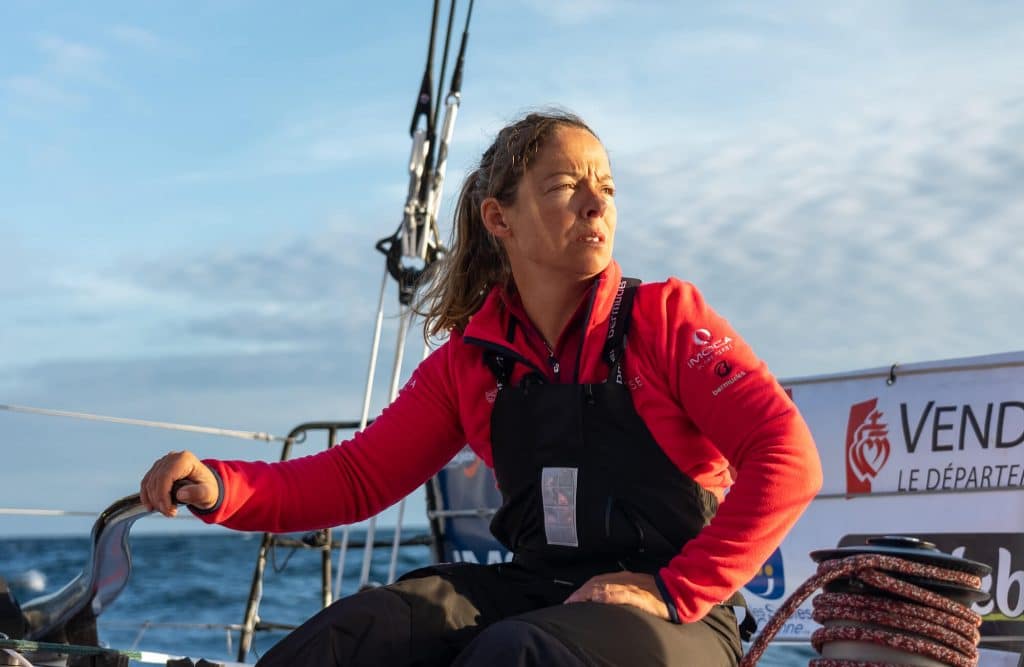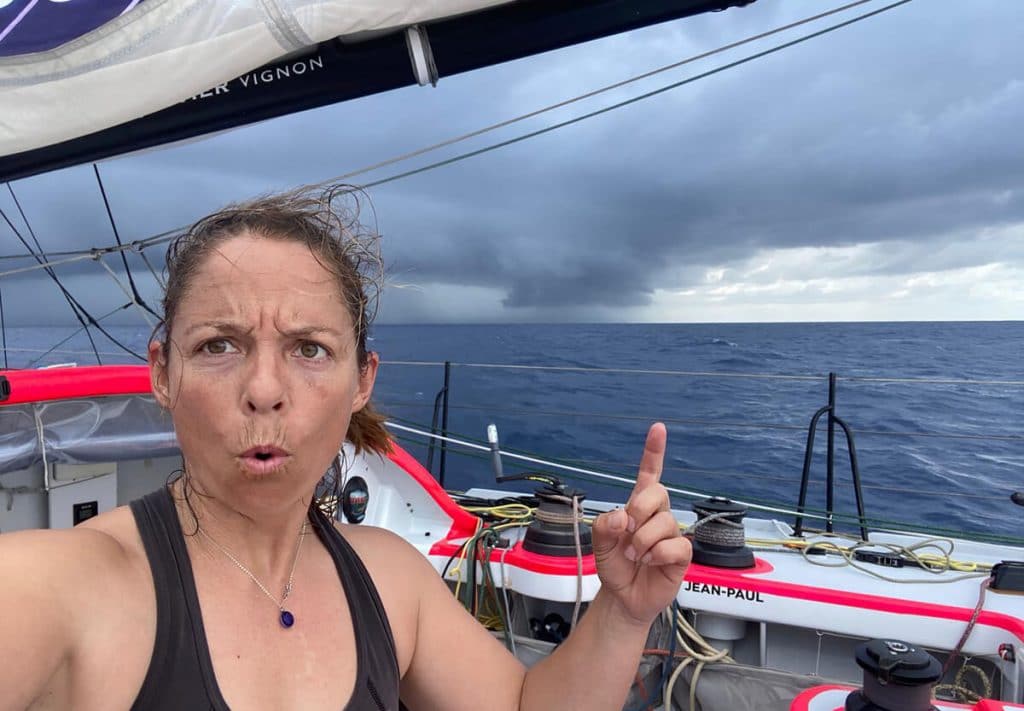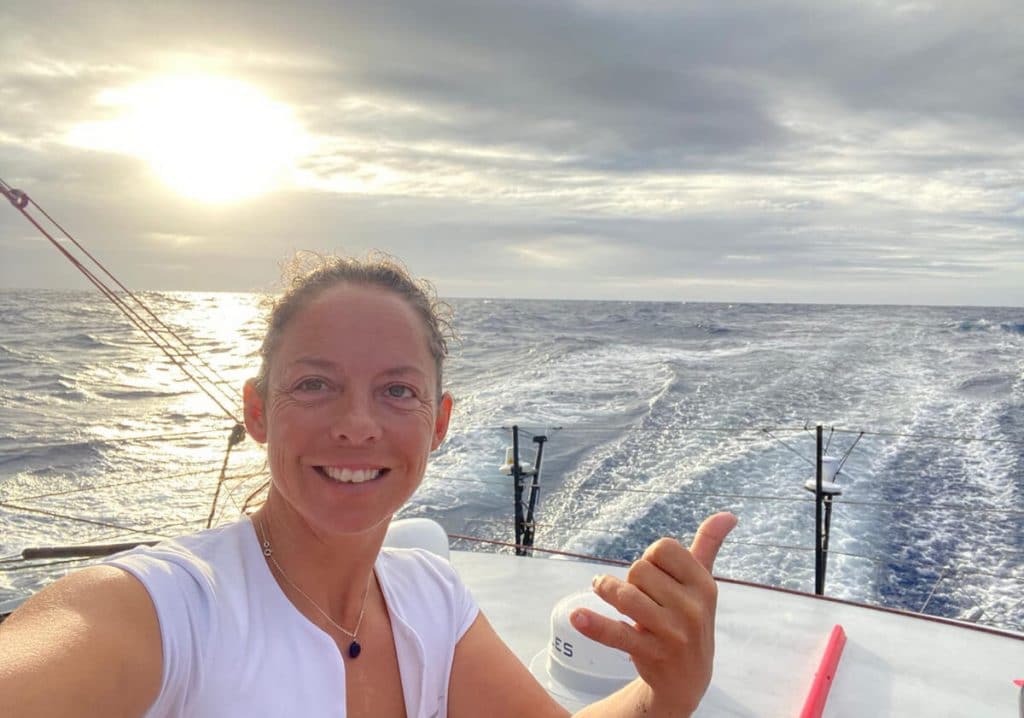Alexia Barrier: sailing round the globe to save her marine “playground”

Last week, the French sailor Alexia Barrier delivered a conference about ocean protection at Monaco’s city hall. Busy preparing for her next solo trip around the globe, the founder of the organisation 4myplanet remains as committed as ever to protecting the planet and creating a greener future.
“Out at sea, you can be completely free, exploring the waters with wildlife by your side, enjoying all the nature,” says Alexia Barrier. “When I’m out on the water, I love not having to follow any other rules besides those for sailing.”
It was at just three years old that she first began sailing. “Me and my parents had just left Paris and moved to Nice. My dad shared a little sailboat with one of his work colleagues down there.” From the turquoise waters of the Mediterranean to the beautiful Breton coast, she has many fond childhood memories of time spent on the sea, discovering the deep blue.
My daughter was always the first one ready to pull off a manoeuvre
Michel Barrier, the sailor’s father
As a teenager, Alexia Barrier would accompany her father during the regattas organised by the airline company he worked for. “My daughter was always the first one ready to pull off a manoeuvre ,” says Michel Barrier. “She could get quite annoyed if our boat didn’t get ahead,” he laughs.
A competitive spirit
“Little by little, I started to get the racing bug. I wanted to win,” explains Alexia Barrier. “She’s always been determined,” says her father. “When Alexia has an idea in mind, she stops at nothing until she sees it through.”
After completing her sports management studies at UFR-STAPS in Nice, Alexia Barrier embarked on her first solo race. Aged 25, she set off from the port in La Rochelle, making her way to Brazil, sailing down the coastline from Salvador to Bahia. “Since then, I’ve always competed in sailing races, be it alone, as a pair, or in a team,” says the sailor. So far, she has crossed the Atlantic around 15 times and has recently completed a trip around the world, participating in the 2020 Vendée Globe.

For 111 days, she saw nobody. Alone with the waves, she only caught a glimpse of land once, when passing Cape Horn, an island in the Tierra del Fuego archipelago, off the southernmost tip of South America. Such a trip required immense concentration. “There was the weather, manoeuvres and broken material to contend with,” says Alexia Barrier. Out on the water, this one-woman team had to deal with technical and physical problems on her own.
“On Christmas Day, my computer split in half and very nearly broke right in the middle of the Indian Ocean,” says the sailor. “I also fractured my back 10 days before the finish, after landing on a piece of plastic on my boat.” Determined as ever, she took painkillers and pushed on with the race. “At times like that, you have to stay optimistic!”
“These races have taught me how to adapt to the elements and I’ve gotten to know my body and its limits much better,” says Alexia Barrier, who placed 24th in the Vendée Globe on the 28 February last year. “I had the oldest boat in the fleet; it was a brilliant adventure, but I knew I couldn’t win,” she explains.
>> TO WATCH: VIDEO. Boris Herrmann and Pierre Casiraghi on Vendée Globe and environmental protection
A wave of plastic
Looking to the future, she is now preparing for her next solo world trip: the 2024 Vendée Globe. “I’m currently looking for sponsors to invest in a high-performance boat which would maybe see me finish the race in the top 10.”
In 2009, Alexia Barrier founded the organisation 4myplanet to protect her “playground”: the ocean. “I’d just crossed the Atlantic and I’d been shocked by the increase in rubbish I’d seen whilst sailing.”

After talking to scientists, Alexia Barrier soon realised that she could modify her boat to help the planet. By installing certain devices, she was able to collect data from the surface water during her races without impacting the environment or her race performance.
Plastic is absolutely everywhere: we eat the equivalent of a credit card every week
Alexia Barrier, a sailor committed to protecting the oceans
“Thanks to my organisation, I am able to afford these measuring tools. They cost between 20,000 and 150,000 euros,” she explains. They allow us to take evaluate the temperature, salt levels and acidity of the oceans, as well as measure the amount of microplastics in the water. “This information feeds into a global bank of free data, ready for researchers and students to analyse.”
Celebrating our oceans
“Plastic is absolutely everywhere: we eat the equivalent of a credit card every week,” says Alexia Barrier, who is raising awareness amongst young people about the threats facing our oceans. “I organise eco-friendly trips with my sailboat from the Vendée Globe. We take people across to Corsica so they don’t have to take a plane or the ferry, as well as transport honey and wine from producers who are worried about the environment.”
Together with her organisation, the sailor hopes to soon launch a festival to promote ocean protection “and of course, zero waste too!”
>> TO READ: Are young people key to fighting ocean plastic pollution in oceans?








